Background
On January 20, 2019, the Turkish Army, allied by the Syrian armed groups, officially announced the start of military operations[1] in the Syrian/Kurdish city of Afrin. Reports providing a summary of 2018’s humanitarian needs stated that the population of Afrin and other areas held by the Syrian Democratic Forces/SDF, north-western Syria, has amounted to 323 thousand persons, of whom 125 thousand are persons internally displaced from other Syrian areas.[2]
On January 22, 2018, only two days into the beginning of military action in Afrin, the National Coalition of Syrian Revolution and Opposition Forces made a statement, in which it stressed full support to the Operation Olive Branch. The introduction came as follows: “The Syrian Coalition expressed its support for the operation being launched with the participation of the Syrian National Army, which incorporates armed groups of the Syrian revolution under the supervision of the Syrian Interim Government, with the aim of freeing a number of towns and villages of the Syrian north from the control of terrorist forces in coordination with Turkey and with support from Turkish air force.”[3]
On February 26, 2018, the Syrian Islamic Council[4], for its part, gave a Fatwa/ruling, through which it considered fighting the Syrian Democratic Forces/SDF “Jihad in the Course of Allah.” The fatwa corresponded to a time where the Turkish Army and the armed opposition groups, as well as extremist Islamic factions were conducting military operations in Afrin. The Turkish President Recep Tayyip Erdoğan, on February 20, 2018, stated that Turkey will cordon Afrin city’s center and withhold external aid from it.[5]
On June 14, 2018, Human Rights Watch published a report, saying that Turkey-backed armed groups in the Free Syrian Army (FSA) have seized, looted, and destroyed property of Kurdish civilians in the Afrin district of northern Syria. The anti-government armed groups have installed fighters and their families in residents’ homes and destroyed and looted civilian properties without compensating the owners[6]. The Independent International Commission of Inquiry on the Syrian Arab Republic also documented patterns of house’ confiscation, especially those belonging to Kurdish civilians, who escaped the violence in the area. Other civilians, however, were prevented from getting their possessions by armed groups, which informed them that they do not have the right to live in the area for their true or alleged support for the People’s Protection Units/YPG. The armed groups, for their part, utilized the confiscated houses for military purposes or to accommodate their fighters and families. Once in the area, after being evacuated from Eastern Ghouta[7], fighters and their family members also seized the places of residence belonging to the Kurdish people who fled the area. It appears that the fighters of the armed groups have systematically imprinted the houses they confiscated.
In a report it published on August 2, 2018, Amnesty International stated that Turkish forces are giving Syrian armed groups free rein to commit serious human rights abuses against civilians in Afrin city, northern Syria. The report added that residents in Afrin are enduring a wide range of violations, mostly at the hands of Syrian armed groups that have been equipped and armed by Turkey. These violations include arbitrary detentions, enforced disappearances, and confiscation of property and looting to which Turkey’s armed forces have turned a blind eye. Some of these groups, and Turkish armed forces themselves, also have taken over schools, disrupting the education of thousands of children. Amnesty has indicated that Turkey is present in Afrin as an occupying force, pointing out to names of armed groups accused of committing grave violations of human rights, including Ferqa/Division 55, Jabha al-Shamiye/Levant Front, Faylaq al-Sham/al-Sham Legion, Sultan Mourad, and Ahrar al-Sharqiye.[8]
1. Views of the Natives and the Displaced people
The native residents of the Kurdish-majority/Syrian Afrin district and forcibly displaced are expressing an overwhelming concern over the attempts of the Turkish government and the so-and-so opposition-affiliated sides, in control of the area, to “obliterate the identity” of its natives and the newcomers in particular, through changing the records at the civil registry directorates, where their place of birth is replaced either by Afrin or other areas-held by Turkish forces (the Euphrates Shield areas). The whole population, both natives and displaced, is coerced into obtaining an identification card/personal identity document/identity document[9], some of which lack information mentioned in the original identity document; others report “misleading or fraudulent” information about the true identity of the persons holding them. The identity document/identification card is issued through a special application/program designed by the Turkish government[10] that is utilized by the local councils, affiliated with the Syrian Interim Government/ the National Coalition for Syrian Revolutionary and Opposition Forces. The cards do not include any distinctions that set internally displaced persons or refugees apart from the local citizens, for all are registered as natives.
In various areas, Afrin in particular, a massive number of displaced people and native residents expressed fear and protested the “identification card” which the local councils demanded that they obtain as to use instead of the identity document issued by the Syrian official directorates, affiliated with the Syrian government/Damascus. Many of the concerned people refused to obtain the “identification card.” In response, the local councils mandated that dealing in matters related to relief, medical services, trade and real estate transactions, sale and purchase, as well as getting work permits be conducted through it exclusively, due to which people were coerced into obtaining them as to spare their children from losing their rights into education, healthcare and other services.
2. Report Methodology
For this report, Syrians for Truth and Justice/STJ conducted a thorough investigation of the news it came by concerning the changes inflicted upon civil records in the Turkey-held areas – Olive Branch and Euphrates Shield. Dozens of open sources on the identification card’s issue were referred to. And then, the following persons were interviewed:
- A former director of a civil registry directorate/expert, who was a general director of the civil registry directorates for 9 years before 2011.
- A female employee, currently working on issuing the identification cards provided to residents in the areas of the “Euphrates Shield” and the “Olive Branch”.
- STJ’s field researcher in the city of Azaz, who has been monitoring the process of forgery of identification cards and other identity documents.
- A native resident from Afrin district, who provided STJ with a photo of the identity card he was granted by the Turkey-affiliated local councils.
- An internally displaced from the al-Rastan area, Homs, who also provided STJ with a photo of the identity card he was given in Afrin district.
- An interview with three persons/eyewitnesses and the father of a Palestinian/Syrian child, who provided STJ with photos of the identity cards they were given by the local councils.
- An additional group of eyewitnesses (especially the displaced who refused to obtain the card for the reasons to be reported).
- An employee, representing the point of view of the local councils and the Turkish government.
- An employee working at one of the Palestinian centers that issue identity documents to Palestinian Syrians.
In total, the number of witnesses interviewed or contacted for the report amounted to (17) persons, while the report itself was presented before (3) legal experts, one of whom is a former Syrian judge.
3. Syrian State-issued Identity Document’s Indicators
STJ contacted a former director of a civil registry (Expert 1), who served as the General Director of the Civil Registry Directorates for nine years before 2011. The employee explained the details and indicators included in the official identity document provided by the Syrian state and the hazardous effects impeded in the identification card issued by the Turkish government and the local councils affiliated with it.
He explained that the word Amaneh/secretariat, written on the identity document provided by the Syrian state, refers to the secretariat of the civil registry with which a citizen is affiliated, for each Syrian province is divided into a specific number of secretariats, where the civil registry directorates are located. The word Kayed/record, however, refers to the village, town, city or neighborhood, where the paper records of a citizen are registered and preserved. There is also the Khaneh/entry, which stands for the family number of a citizen in the village or town where he/she originally belongs, as each family has a number which the great-grandfather of the family used to hold, and, then, is passed to his offspring. The Khaneh/entry also refers to the number of indigenous families present in the town or village, but it does not provide statistics about the population, taking into consideration the significant difference between the two concepts.
Commenting on granting citizens, internally displaced, identification cards with false records, the expert said:
“This undertaking causes losing track of families’ lineage and their history, which, in turn, will lead to a loss of several related rights. Changing a citizen’s record in such manner effects massive chaos in the Syrian society, and it might deprive a citizen of his/her citizenship later on. Regardless of a person’s being pro or anti-regime in Syria, the matter of the civil registry and issuing identity documents is an inherent function of the State in power, since it enjoys the UN’s recognition and no other side is entitled to change the citizens’ records.”
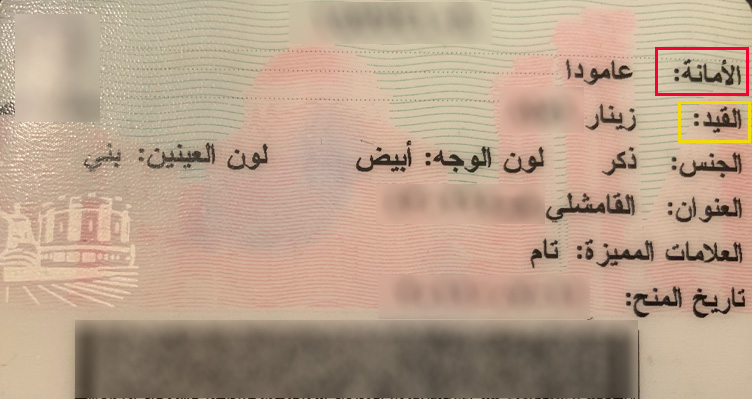
The back of the identity document granted by the Syrian state to citizens. In the red square, the amaneh/secretariat is mentioned, referring to the civil registry secretariat with which a citizen is affiliated because each of the Syrian provinces is divided into a specific number of secretariats, where the civil registry directorates are based. In the yellow square, nonetheless, the kayed/record is mentioned, indicating the village, town, city or neighborhood where a citizen is registered and his/her paper records are maintained.
4. The Civil Registry’s Working System Obliterates the Identity of Displaced people and the Area’s Natives:
STJ has contacted a Civil Registry female employee[11] (Expert 2), who made it clear that the program/application utilized by the registry has been designed by the Turkish government and that it is greatly “specialized” to be area/city-specific. Each administrative area in the north and north-western parts of Aleppo province has its own version of the program, listing only the names of the districts that are administratively affiliated with it. The copy, provided by the Turkish government, does not allow employees to enter data or area they want into the two columns of amaneh/secretariat and kayed/record, for the program automatically fills the column based on the program copy designated to the area, which means that the original amaneh/secretariat, kayed/record and khaneh/entry of the internally displaced person cannot be fed into the program.
The employee, for his part, stressed that the program’s data are directly linked to the Turkish Ministry of Interior in the capital Ankara, adding that:
“Once the data of a person is fed into the program, the information is automatically saved at the program’s main servers in Ankara. Before the card is printed or delivered to the owner, his/her information would be maintained by the Ministry of Interior.”
The female employ confirmed that the program/application she uses and the data preserved in the database include neither the original place nor entry of a person’s record, for a column is not provided for this information. However, they are kept in a paper file, containing a hardcopy of the identity document or individual civil registration extract that a person hands over to the civil registry’s employee. Here, it is important to mention that these paper records could be damaged, burned or lost for whatever simple reasons.
The female employee pointed out the “gaps” in the civil registry’s program, saying:
“For example, if the displaced person is originally from al-Rastan district/Homs and is based in Afrin/Aleppo, where in the original identity document, issued by the Syrian government, the secretariat is stated al-Rastan and the record and entry as al-Rastan al-Fawqani, entry xx, these information are overlooked upon obtaining the identification card, issued by the Turkish government, where the secretariat is registered in accordance with Afrin district while the record is filled with her/his current address, without any indication to the person’s original record, where the place of birth is then limited to a single word, al-Rastan, for instance. The program also provides columns that do not appear on the printed identification card, including the civil status, blood type and distinctive features.”
The employee also mentioned that many identification cards provide false information and data about their holders, for many persons have forged civil registration extracts, both of individuals and families, even the identity documents that have been issued by the Syrian government, according to which the new identification cards have been issued, especially in the city of Azaz. In some cases, the employee states, the place and date of birth were also forged, as to join the police service or to pursue an underage marriage. Due to this, the data registered on any of the identification cards might be fraudulent, for the Civil Registry Directorate does not have a mechanism to conduct checkups of information or persons, a task allocated to local mukhtars[12] of the displaced or the local council in the area.
STJ’s field researcher (Witness 3) reported that forging official documents and identity extracts is not that difficult, especially in the city of Azaz, where the cost of obtaining a fraudulent identity document is 15000 Syrian pounds, the equivalent to 3USD.
STJ managed to obtain copies of the identification cards granted to a local resident (Local witness 4), in the city of Afrin, and photos of cards belonging to an internally displaced person also based in the city (Displaced witness 5), in addition to copies of three adults and a child, one of whom is a stateless refugee (Palestinian Syrian), the second is a displaced from Eastern Ghouta, his place of birth, and the third is displaced from Eastern Ghouta, however, born in the city of Marea (Displaced witnesses 6, 7, 8, 9). Comparing the data provided by each of the identification cards, it becomes clear that the refugees, the displaced and the area’s natives cannot be separated from each other, for each of the cards reports the record and the secretariats affiliated to the areas-held by Turkey, without an indication to the original record or entry of the holder. The employee at the civil registry reported that there are not distinctive marks in the card that would set the natives apart from the displaced people.
The female employee at the civil registry (Expert 2) said that a significant portion of the natives was actually born outside the administrative borders of Aleppo province, but still, they were granted identification cards similar to those given to internally displaced persons, in which neither the secretariat nor the record is mentioned. This case applies to former Syrian government employees, born in Aleppo’s north. These were employees in Damascus, where they got married and had children. Their children were registered as born in Damascus, without the slightest indication to their being original residents of Aleppo. According to this and due to the current adopted procedures, the area’s native residents are at risk of losing their records, just like their displaced counterparts.
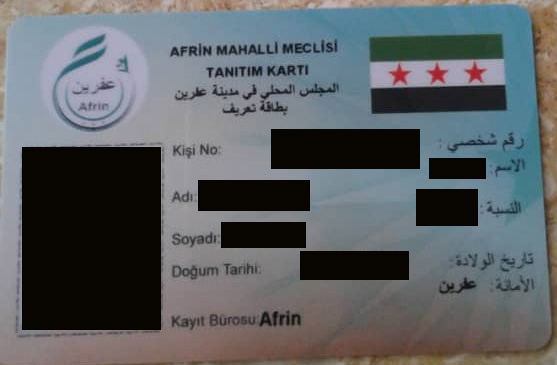
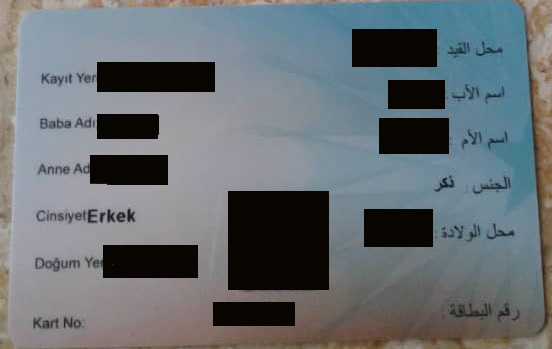
Photo of the identification card provided by the local council, according to the Civil Registry system imposed by Turkey. The card belongs to one of Afrin’s native residents, where the secretariat is recorded as being in Afrin.
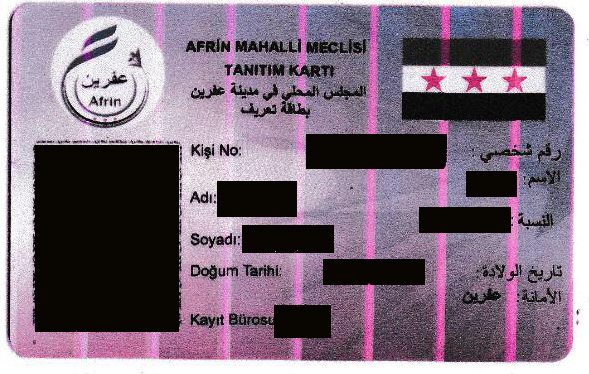
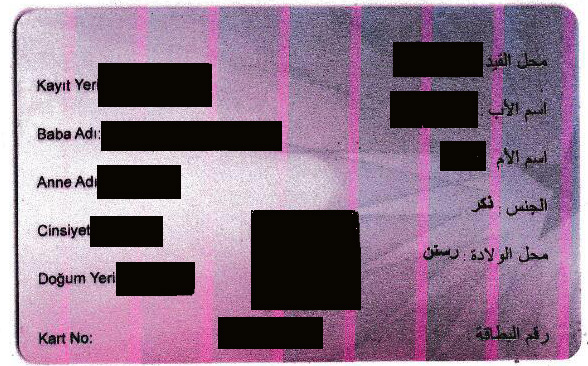
Photo of the identification card provided by the local council, according to the Civil Registry system imposed by Turkey. The card belongs to an internally displaced person in Afrin, who was born in al-Rastan. When regular proceedings are followed, the original secretariat and record of a person are written, even if he/she is born in a different place. For example, if a person is born in Damascus while he/she is originally from Homs, the place of birth is, then, written as being in Damascus. But still, his/her record is linked to that of the family in his/her original area, where his parents are from.
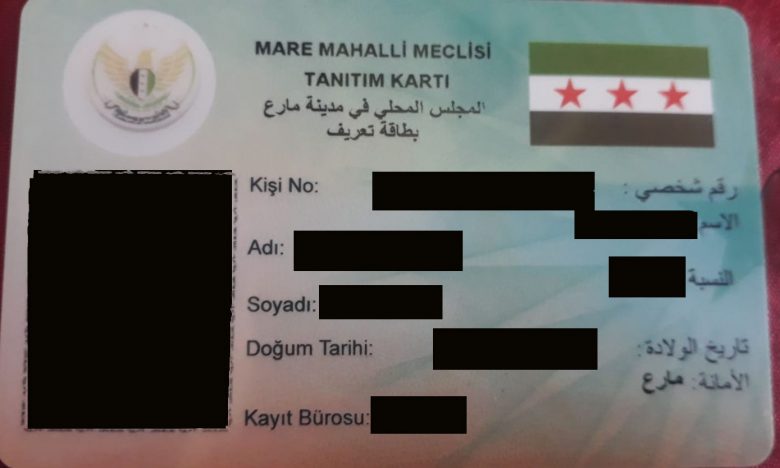
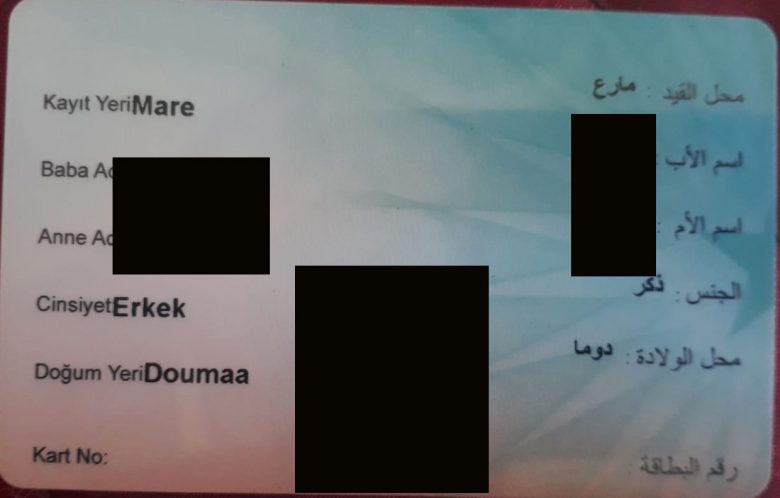
Photo of the identification card provided by the local council, according to the Civil Registry system imposed by Turkey. The card belongs to an internally displaced person in Marea, who was born in Douma city, eastern Ghouta. Regular proceedings necessitate that the original secretariat of a person be included, not a different secretariat or registration place like in the case of this identification card, where Marea is written in reference to the secretariat.
5. Native and Internally Displaced Residents Fear Identity Eradication:
Interviewed by STJ, a local resident (Local witness of the native residents 10) based in Afrin said that issuing an identification card/identity document/personal identity document by Turkey and granting it to local residents and displaced alike, without distinctive marks, is an initial step in the long-term demographic changes intended for the area, aiming at changing the demographic structure of the native Kurdish residents. The witness stressed that there is a state of outrage among the locals concerning the matter, many of whom refused to obtain the card, which triggered the local council to set a delaine, August, for obtaining it. He said:
“This identification card was imposed on us, and we were obliged to use it for pursuing administrative transactions. There are warnings that non-holders of the card are to be denied aid, projects, free healthcare and other services. […] There is no need for such a card, for the majority of the people have the Syrian government-issued identity document. In addition to this, if they intend to set security into order, they can issue cards for people who do not have any identification documents only. Even if the card is a necessity, why would the displaced’s secretariat and record be reported as those belonging to Afrin’s natives and his/her original record gets ignored? Is not the program supposed to be designed in a manner to preserve the displaced’s origins?”
Likewise, several internally displaced persons in Afrin refused to obtain the identification card because their original secretariats and records were changed. STJ has interviewed a displaced person (Displaced witness 11), who refused to obtain the card, and, thus, his three years old child was deprived of free healthcare services. He was, then, forced to go from Afrin to the villages of Atmeh and Aaqrabâte, Idlib, to provide his son with periodic vaccinations and treatment. He said:
“I refused to obtain the identification card even though it facilitates for getting free healthcare services because the secretariat and record of my family and mine would have been changed. I am from rural Damascus and would not accept my record being changed into Afrin.”
Another person (Displaced witness 12), displaced from northern rural Homs and based in Afrin, said:
“I did not take the risk and obtain the card, for it lacks clarity and transparency today and in the future. A column could be designated for the original place of registration and another for the place of residence, a manner which could have preserved our identity and record while realizing the security objective they are talking about. However, with its current form, the card does not indicate our true records. I believe that it will be a threshold to demographic changes and efforts to exclude a specific group from its original place of birth, as well as installing it in another area, in the place of its original population. I did not want to be part of this scheme. It should be kept in mind that the Syrian identity document does not have to do with the regime in power; it is a proof of us being citizens in Syria as a country.”
On the same note, under a pseudonym, Khalid (Displaced witness 13), who has been displaced from rural Damascus, said that he was forced to obtain the identification card to enroll his daughter in school and to provide his other two children with free healthcare services. He said:
“I went to the neighborhood’s mukhtar; he gave me a sealed document, filled with my personal information. Then, I referred to the Civil Registry and gave them the document. They registered the data once more and took my fingerprints. I paid 500 Syrian pounds as a fee to obtain the card. My record and its entry were changed to the name of the neighborhood where I live in Afrin. This thing would harm my family and me in the long term. But I am coerced to obtain the card, for the medical and relief aid are dependent on having it.”
A woman (Displaced witness 14), displaced from eastern Ghouta in Damascus and based in northern rural Aleppo, said that she and her family obtained the identification cards, including her infant girl, to whom she gave birth shortly after leaving eastern Ghouta. She added:
“I did not consider how dangerous the card is in the beginning; I obtained it because it was mandatory for any education service and hospital-related activities. The Turkish hospital near my house refused to treat my infant unless she had the card. However, as I contemplated the matter deeply, I came to believe that it is a major threat to my children’s future. It caught my attention that on the card our original registration place was not written; it was, instead, replaced by our address in this town in northern rural Aleppo. How would my children be able to demand their rights in the future, being registered under false records here while have not been registered according to the procedures followed by the ruling regime? I have not registered my marriage at the regime’s directorate as well, for I got married during the siege of Douma city. In this case, my children’s true identity and records would be lost.”
For his part, the media official of the Afrin Local Council (Employee witness 15) told STJ that the cards issued by the civil registries are only identification cards and are not official identity documents. They have, additionally, been issued for security and statistical purposes, for massive numbers of internally displaced persons do not have identity documents. He added that the cards are issued only to facilitate the work of organizations and official departments, such as the police, hospitals, and schools. Commenting on the detail that the identification cards do not refer to the original place of registration of a displaced person and that in terms of form they do not provide for a distinction between the area’s natives and displaced person, N. Lila said that the civil registry preserves only the paper folders and records of each card, which provide all the data concerning a person and that they can be referred to any time.
6. Local Attempts Seek Preservation of Original Identity:
Local entities, representing the internally displaced persons in the Turkey-held areas, are documenting and registering civil status-related events, in addition to issuing family and individual civil registration extracts, in an attempt at preserving the identity and lineage of the families coerced into leaving their cities to northern Aleppo. With their persistent efforts and getting the recognition of the Syrian Interim Government, these entities are not allowing any steps aiming at inflicting demographic changes on these families.
Of these entities is Homs IDPs Office, which registers civil status-related events and issues family and individual civil registration extracts for people displaced from Homs, whose number amounts to about 7000 families in Afrin district alone. The Office operates in cooperation with the local councils and with support from the Syrian Interim Government. STJ’s field researcher reported that Turkey has already asked the office to suspend its activities and depend on the local councils, which the displaced persons refused. The office, accordingly, sealed an agreement with Turkey, providing for continuing its work on registering births, deaths, marriages, family and individual records, without attempting to issue any identity documents or identification cards. The last undertaking was assigned to the Mukhtar, delegated by the Afrin Local Council, through whom identification cards are to be issued with help of the civil registry, but not the Homs IDPs Office.
In coordination with the local councils in northern rural Aleppo, local Mukhtars of internally displaced persons, such as the Mukhtars of Douma and Irbin, among others, are working on issuing family and individual civil registration extracts, depending on the Mukhtar’s personal familiarity with a person and his/her family, in addition to two witnesses to prove the person’s identity. On this note, STJ’s field researcher said that people internally displaced from eastern Ghouta and based in the Euphrates Shield areas are seeking to constitute a General Committee to represent them and manage their affairs in the area, in the steps of the Homs IDPs Office.
Concerning granting the Palestinian refugees, displaced/migrated to the Euphrates Shield and Olive Branch areas, identification cards similar to those provided to the area’s residents of the Syrian internally displaced persons, STJ’s field researcher interviewed Mr. Ammar al-Qudssi, Director of the Documentation Center of Palestinian Refugees in Northern Syria (Expert/witness 16), who explained that about 1500 Palestinian families are based in Northern Syria, many of whom have obtained the identification card and whose original places of registration were ignored. He stressed that no distinction can be made between the cards granted to them and those given to Syrian citizens.
He commented, saying:
“I talked at length with the local officials of the civil registries; I have also talked to the Turkish official, explaining the risk involved in registering the Palestinian refugees like registering Syrian citizens, ignoring their records and place of registration. The Turkish official answered that they were working on designing a program designated for registering the Palestinian refugees in their records, as to preserve their identity and their status as refugees. The local officials, for their part, stressed that the aim of the identification card is a security-related census and that it is temporary until new identification documents are issued in the future.”
Al-Qudssi stressed that the Center is working on documenting and registering all the civil status transactions involving the Palestinian refugees, as they can never be deprived of that status, because they are adopting a registration system within the legal regulations and the working manners of the civil registries, in keeping with UNRWA standards, because the center aims to get the organization’s recognition of these records to ensure the preservation of the Palestinian refugees’ identity and to prevent any attempts at their resettlement.
[1] The Independent International Commission of Inquiry on the Syrian Arab Republic/IICI reported that a few of the opposition-affiliated armed groups, operating within the ranks of the Free Syrian Army/FSA, which participated in the operations are Harakat Ahrar al-Sham al-Islamiyya, al-Sham Legion, al-Nokhba/Elite Army, Jaysh al-Sharqiya/Army of Eastern Area, al-Shamiya Front/Levant Front and Nour al-Din al-Zenki Movement. United Nations Human Rights Council/39th session. The report of the Independent International Commission of Inquiry on the Syrian Arab Republic, August 9, 2019. Issued on September 12, 2019. P. 7. Para. 19. Last visited: August 5, 2019. https://www.ohchr.org/EN/hrbodies/hrc/iicisyria/pages/independentinternationalcommission.aspx.
[2] Ibid.
[3] “Syrian Coalition: Operation ‘Olive Branch’ is Fundamental Part of Battle Against Dictatorship,” National Coalition of Syrian Revolution and Opposition Forces. January 22, 2018. Last visited: August 5, 2019. http://en.etilaf.org/all-news/news/syrian-coalition-operation-olive-branch-is-fundamental-part-of-battle-against-dictatorship.html.
[4] In mid-April 2014, about 40 Sunni Shari’a associations and committees held a meeting, on which they announced the foundation of the Syrian Islamic Council in Istanbul city, Turkey. The council is headed by scholar Ausama al-Refa’i while scholar Mou’ath al-Khun was assigned his deputy.
[5] “Turkey to lay siege to Afrin city center soon: Erdogan,” Anadolu Agency. February 20, 2018. Last visited: August 5, 2019. https://www.aa.com.tr/en/todays-headlines/turkey-to-lay-siege-to-afrin-city-center-soon-erdogan/1068471.
[6] “Syria: Turkey-Backed Groups Seizing Property,” Human Rights Watch. June 14, 2018. August 7, 2019. https://www.hrw.org/news/2018/06/14/syria-turkey-backed-groups-seizing-property.
[7] See A/HRC/38/CRP.3, paras. 68–70. https://www.ohchr.org/EN/hrbodies/hrc/iicisyria/pages/independentinternationalcommission.aspx.
[8] “Syria: Turkey must stop serious violations by allied groups and its own forces in Afrin,” Amnesty International. August 2, 2018. Last visited: August 7, 2019. https://www.amnesty.org/en/latest/news/2018/08/syria-turkey-must-stop-serious-violations-by-allied-groups-and-its-own-forces-in-afrin/.
[9] At the top of the granted card, the term “Identification Card” is written. However, the expressions “Identity/Personal Identity Document” or the “New Personal Identity Document” are used on certain official occasions. For instance, the last expression is used by the local council of Azaz city and its countryside in a circular issued on October 23, 2018, in which the council banned people from referring to any of the area’s directorates without bearing the “New Personal Identity Document.” Azaz City and Its Countryside Local Council. October 23, 2018. Last visited: August 7, 2019. https://www.facebook.com/azaz.c.local/photos/a.338022073049951/976096142575871/?type=3&theater.
[10] At odds with the official statement made by the Director of al-Bab City Local Council Jamal Othman to Syria TV on May 26, 2018, that the new identification card’s information will be written in both Arabic and English, without Turkish, the information on the granted cards are actually written in Arabic and Turkish, but not English. For further information refer to the following link: Al-Bab Local Council Intends to Issue Turkey-affiliated ‘Identification’ Cards.” Syria TV. May 26, 2018. Last visited: August 7, 2019. https://www.syria.tv/content/%D9%85%D8%AD%D9%84%D9%8A-%D8%A7%D9%84%D8%A8%D8%A7%D8%A8-%D9%8A%D8%B9%D8%AA%D8%B2%D9%85-%D8%A5%D8%B5%D8%AF%D8%A7%D8%B1-%D8%A8%D8%B7%D8%A7%D9%82%D8%A7%D8%AA-%D8%B4%D8%AE%D8%B5%D9%8A%D8%A9-%D9%85%D8%B1%D8%AA%D8%A8%D8%B7%D8%A9-%D8%A8%D9%80-%D8%AA%D8%B1%D9%83%D9%8A%D8%A7.
[11] STJ refrained from naming the female eyewitness at her request, fearing prosecution, given that STJ maintains her personal information in a secure place.
[12] Mukhtar is the governor of a village, town or neighborhood.

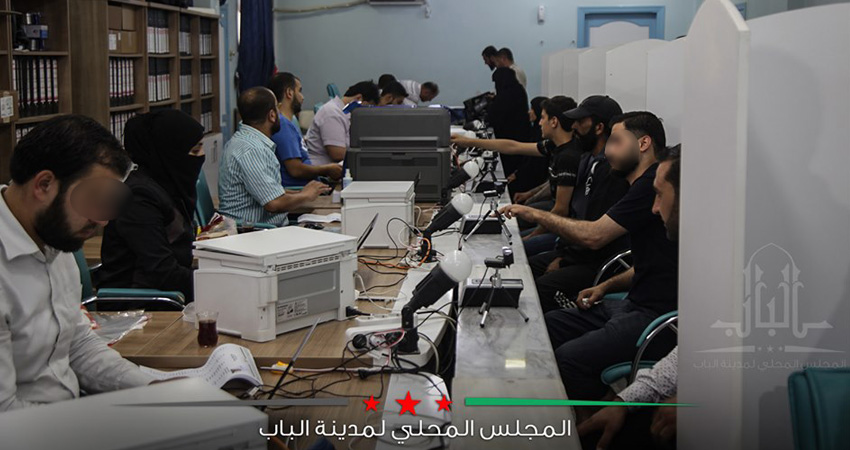
1 comment
[…] [2] For more info see: “Syria: Turkish Identification Cards Obliterate Identity of Natives and Displaced populations Alike”, STJ, October 21, 2019 (last visit: January 13, 2020) https://stj-sy.org/en/syria-turkish-identification-cards-obliterate-identity-of-natives-and-displace…. […]